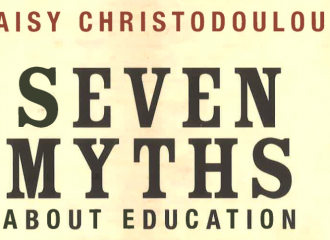Boeken over onderwijs
Onder boeken vind je alle boeken die ik gelezen heb sinds 2013 en direct of indirect met onderwijs te maken hebben. Ik verdeel de boeken in speldidaktiek, onderwijsdidaktiek, lesinhoud, creatief schrijven, en overig.
(zie ook mijn goodreads boekenplank)
Onderwijsdidaktiek
Mortimer J. Adler, Charles van Doren, How to Read a Book: The Classic Guide to Intelligent Reading, 1940, ★★★★★
Mortimer J. Adler, How to Speak / How to Listen, 1983, ★★★★☆
Gert Biesta, De terugkeer van het lesgeven, 2018, ★★★☆☆
Sanne Blauw, Het bestverkochte boek ooit (met deze titel): Hoe cijfers ons leiden, verleiden en misleiden, 2018, ★★★☆☆
Jan Bransen, Gevormd of Vervormd – Een pleidooi voor ander onderwijs, 2019, ★★☆☆☆ [review deel 1] [review deel 2]
Peter C. Brown, Henry L. Roediger III, Mark A. McDaniel, Make It Stick: The Science of Successful Learning, 2014, ★★★★★
Daisy Christodoulou, Seven Myths about Education, 2013, ★★★★☆ [review]
Daisy Christodoulou, Making Good Progress?: The future of Assessment for Learning, 2017, ★★★★☆ [review]
Daisy Christodoulou, Teachers vs Tech, The case for an ed tech revolution, 2020, ★★★★★
Gianfranco Conti and Steve Smith, Breaking the Sound Barrier: Teaching Language Learners How to Listen, 2019, ★★★☆☆
Stanislas Dehaene, How We Learn: The New Science of Education and the Brain, 2018, ★★★★★
Sjef Drummen, Catharsia, 2019, ★★★☆☆
Sjef Drummen, Je mag geen eisen aan leerlingen stellen: Maak een kunstwerk van je leven, 2023, ★★★☆☆
Kieran Egan, Teaching as Story Telling: An Alternative Approach to Teaching and Curriculum in the Elementary School, 1988, ★★★☆☆
Kieran Eran, Teaching as Story Telling: An Alternative Approach to Teaching and Curriculum in the Elementary School, 1988, ★★★☆☆
Sjef Drummen, Catharsia, 2019, ★★★☆☆
Mark & Zoe Enser, Fiorella’s & Mayer’s Generative Learning in Action, 2020, ★★★★☆
Mike Gershon, How to Use Bloom’s Taxonomy in the Classroom: The Complete Guide, 2015, ★★★★☆
Jay Heinrichs, Thank You for Arguing: What Aristotle, Lincoln, and Homer Simpson Can Teach Us About the Art of Persuasion, 2007, ★★★☆☆
E.D. Hirsch Jr., Why Knowledge Matters: Rescuing Our Children from Failed Educational Theories, 2016, ★★★★☆
Kate Jones, Retrieval Practice: Research & Resources for Every Classroom, 2020, ★★★★☆
Paul A. Kirschner, Tine Hoof, De Leraar: Vakmanschap in onderwijs, 2024, ★★★★☆
René Kneyber, Toetsrevolutie: Naar een feedbackcultuur in het voortgezet onderwijs, 2016, ★★★☆☆
René Kneyber, Dominique Sluijsmans, Valentina Devid, Blanca Wilde López, Formatief handelen: Van instrument naar ontwerp, 2022, ★★★★☆
Alfie Kohn, Punished by Rewards, the trouble with Gold Stars, Incentive Plans, A’s, Praise and Other Bribes, 1993 (2018), ★★★☆☆
Roger J. Kreuz, Richard Roberts, Becoming Fluent: How Cognitive Science Can Help Adults Learn a Foreign Language, 2015, ★★★☆☆
James Mannion, Kate McAllister, Fear Is The Mind Killer: Why Learning to Learn deserves lesson time – and how to make it work for your pupils, 2020, ★★☆☆☆
James A. Maxwell, Making Every MFL Lesson Count: Six principles to support modern foreign language teaching, 2019, ★★★★☆ [review]
John Michell, Rachel Grenon, Earl Fontainelle, Adina Arvatu, Andrew Aberdein, Octavia Wynne, Gregory Beabout, Trivium: The Classical Liberal Arts of Grammar, Logic, & Rhetoric, 2016, ★★★★☆
Ross Morrison McGill, Mark. Plan. Teach., 2017 ★★★☆☆
Martha C. Nussbaum (vert. Rogier van Kappel), Niet voor de winst: waarom de democratie de geesteswetenschappen nodig heeft, 2013, ★★★☆☆
Neil Postman, The End of Education: Redefining the Value of School, 1995, ★★★☆☆
Alex Quigley, Why Learning Fails, 2024, ★★★★☆
Martin Robinson, Trivium 21c: Preparing Young People for the Future with Lessons From the Past, 2013, ★★★★★
Martin Robinson, Curriculum: Athena versus the machine, 2019, ★★☆☆☆
Marcel Schmeier, Bordwerk en aantekeningen, 2020, ★★★★☆
Marcel Schmeier, Expliciete Directe Instructie in het vo, 2023, ★★★★☆
Sally E. Shaywitz, Jonathan Shaywitz, Overcoming Dyslexia, 2003, ★★★☆☆
Tom Sherrington, Rosenshine’s Principles in Action, 2019, ★★★★☆
Tom Sherrington, The Learning Rainforest: Great Teaching in Real Classrooms, 2023, ★★★★☆
Steve Smith, Gianfranco Conti, The Language Teacher Toolkit, 2016, ★★★★☆
Dale J. Stephens, Hacking Your Education: Escape Lectures, Save Thousands, and Hustle Your Way to a Brighter Future, 2013, ★☆☆☆☆
Andy Tharby, Making every English lesson count: Six principles to support great reading and writing, 2017, ★★★☆☆
Jamie Thom, Slow Teaching: On finding calm, clarity and impact in the classroom, 2019, ★★☆☆☆
Sonia Thompson, Berger’s An Ethic of Excellence in Action, 2022, ★★☆☆☆
Natalie Wexler, The Knowledge Gap: The Hidden Cause of America’s Broken Education System–and How to Fix it, 2019, ★★★★☆
Daniel T. Willingham, Why Don’t Students Like School?: A Cognitive Scientist Answers Questions about How the Mind Works and What It Means for the Classroom, 2009, ★★★★★
Stijn Vanhoof, Geert Speltincx, Feedback in de klas, 2021
Lesinhoud (Engels/Literatuur)
Christopher Booker, The Seven Basic Plots: Why We Tell Stories, 2004, ★★☆☆☆
Neil Bowen, The Art of Writing English Literature Essays: for GCSE, 2020, ★★★★☆
Joseph Campbell, The Hero with a Thousand Faces, 1949, ★★★☆☆
John Carey, A Little History of Poetry, 2020, ★★★★☆
Grant Faulkner, The Art of Brevity: Crafting the Very Short Story, 2023, ★★★☆☆
E.M. Forster, Aspects of the Novel, 1927, ★★★☆☆
Thomas C. Foster, How to Read Literature Like a Professor: A Lively and Entertaining Guide to Reading Between the Lines, 2003, ★★★☆☆
Thomas C. Foster, How to Read Novels Like a Professor: A Jaunty Exploration of the World’s Favorite Literary Form, 2008, ★★☆☆☆
Judith C. Hochman, The Writing Revolution: A Guide to Advancing Thinking Through Writing in All Subjects and Grades, 2017, ★★★★☆
Alan Jacobs, The Pleasures of Reading in an Age of Distraction, 2011, ★★★★☆
Ian C. Johnston, Essays and Arguments: A Handbook for Writing Student Essays, 2015, ★★★☆☆
Ellen Jovin, Rebel with a Clause: Tales and Tips from a Roving Grammarian, 2022, ★★★☆☆
Martha J. Kolln, Rhetorical Grammar: Grammatical Choices, Rhetorical Effects, 1991, ★★★☆☆
Marjolein Korstanje, Teksten in de Maak: Leerlingen begeleiden bij het schrijven, 2012, ★★★★☆
John Mullan, How Novels Work, 2006, ★★★☆☆
Mary Oliver, A Poetry Handbook, 1994, ★★★★☆
Alex Quigley, Closing the Vocabulary Gap, 2018, ★★★★☆
Alex Quigley, Closing the Writing Gap, 2022, ★★★☆☆
William Jr Strunk, E.B. White, The Elements of Style, 1959,★★★★☆
Scott Thornbury, Beyond the Sentence, 2005, ★★★☆☆
Nigel Warburton, The Basics of Essay Writing, 2007, ★★★★☆
William Zinsser, Writing to Learn: How to Write–And Think–Clearly about Any Subject at All, 1988, ★★★☆☆
Speldidaktiek
Kevin Bell, Game On!: Gamification, Gameful Design, and the Rise of the Gamer Educator, 2017, ★★★☆☆
Bernard De Koven, The Well-Played Game: A Player’s Philosophy, 2013, ★★☆☆☆
Matthew Farber, Gamify Your Classroom: A Field Guide to Game-Based Learning, 2014, ★★★★☆
Tracy Fullerton, Game Design Workshop: A Playcentric Approach to Creating Innovative Games, 2008, ★★★★★
Jane McGonigal, Reality is Broken: Why Games Make Us Better and How They Can Change the World, 2010, ★★★★☆
James Paul Gee, What Video Games Have to Teach Us About Learning and Literacy, 2007, ★★★★★
Andrew Glassner, Interactive Storytelling: Techniques for 21st Century Fiction 2004, ★★★☆☆
Karl M. Kapp, The Gamification of Learning and Instruction: Game-Based Methods and Strategies for Training and Education, 2012, ★★★★★
Raph Koster, A Theory of Fun for Game Design, 2004, ★★★★☆
Michael Matera, Explore Like a PIRATE: Gamification and Game-Inspired Course Design to Engage, Enrich and Elevate Your Learners, 2015, ★★★★☆
Lee Sheldon, The Multiplayer Classroom: Designing Coursework as a Game, 2011, ★★★☆☆
AI (en onderwijs)
Barend Last, Thijmen Sprakel, Chatten met Napoleon, 2024, ★★☆☆☆
Emmanuel Maggiori. Smart Until It’s Dumb: Why artificial intelligence keeps making epic mistakes—and why the AI bubble will burst, 2023, ★★★★☆
Ronald Meester, Marc Jacobs, De onttovering van AI, 2024, ★★★★☆
Matt Miller, AI for Educators: Learning Strategies, Teacher Efficiencies, and a Vision for an Artificial Intelligence Future, 2023, ★★☆☆☆
Arvind Narayanan, Sayash Kapoor, AI Snake Oil: What Artificial Intelligence Can Do, What It Can’t, and How to Tell the Difference, 2024, ★★★★☆
Hoogbegaafdheid
Tessa Kieboom, Kathleen Venderickx, Meer dan intelligent, 2017, ★★☆☆☆
Els Schrover, Uitdagend onderwijs aan begaafde leerlingen, 2015, ★★★★☆
James T. Webb, Elizabeth A. Meckstroth. Guiding the Gifted Child: A Practical Source for Parents and Teachers, 1985, ★★★★☆
Creatief schrijven
Carly Berg, Writing Flash Fiction: How to Write Very Short Stories and Get Them Published, 2015, ★★★☆☆
Alma Books, Exercises in Style, 2012, ★★★☆☆
Orson Scott Card, Characters & viewpoint, 2010, ★★★★☆
Janice Hardy, Understanding Show, Don’t Tell (And Really Getting It), 2016, ★★★★☆
Timothy Hickson, On Writing and Worldbuilding: Volume I, 2019, ★★★★☆
Nancy Lamb, The Writer’s Guide to Crafting Stories for Children, 2001, ★★★★☆
Nancy Lamb, The Art and Craft of Storytelling: A Comprehensive Guide to Classic Writing Techniques, 2008, ★★★★★
Tara Lynn Masih (ed.), The Rose Metal Press Field Guide to Writing Flash Fiction: Tips from Editors, Teachers, and Writers in the Field, 2009, ★★★★☆
Dinty W. Moore (ed.), The Rose Metal Press Field Guide to Writing Flash Nonfiction, 2012, ★★★☆☆
Daniel Nayeri, How to Tell a Story, 2015, ★★★★☆
Alexander Steele (Editor), Gotham Writers’ Workshop, Writing Fiction: A Practical Guide from New York’s Acclaimed Creative Writing School, 2003, ★★★★
Philologie / taalwetenschappen
Charles Laurence Barber, The Story of Language, 1964, ★★★★☆
Malvyn Bragg, The Adventure of English: The Biography of a Language, 2003, ★★★★☆
Overig
Joseph Campbell, Stuart L. Brown, Phil Cousineau, The Hero’s Journey: Joseph Campbell on His Life and Work, 1990, ★★★☆☆
Mihaly Csikszentmihalyi, Creativity: Flow and the Psychology of Discovery and Invention, 1996, ★★★★★
Mihaly Csikszentmihalyi, Flow: The Psychology of Optimal Experience, 1990, ★★★★★
Ward Farnsworth, The Practicing Stoic, 2018, ★★★★★
Ward Farnsworth, The Socratic Method: A Practitioner’s Handbook, 2021, ★★★★☆
Johann Hari, Lost Connections: Uncovering the Real Causes of Depression – and the Unexpected Solutions, 2018, ★★★★☆
David McRaney, You Can Beat Your Brain, 2013, ★★★★☆
Mirjam Remie, Het Gymnasium, 2022, ★★★☆☆
Carl Sagan, The Demon-Haunted World: Science as a Candle in the Dark, 1995, ★★★★☆
Abigail Shrier, Bad Therapy: Why the Kids Aren’t Growing Up, 2024, ★★★★☆
Martin E.P. Seligman, Flourish: A Visionary New Understanding of Happiness and Well-being, 2011, ★★★★☆
Simon Sinek, The Infinite Game, 2019, ★★★★☆
James T. Webb , Elizabeth A. Meckstroth, Guiding the Gifted Child: A Practical Source for Parents and Teachers, 1985, ★★★★☆



Catharsia, het anti-mayonaiseboek
Door Sjef Drummen
tweede.druk is uitverkocht. Ik heb wel leenboek.
28 sept. Nieuw boek
” je mag geen eisen aan leerlingen stellen”.
Ik stuur je uitnodiging. Gr Sjef